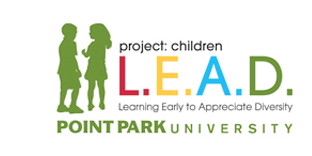Lesson 3 Using Words to Work Things Out Lesson Series

Curriculum | Resources | Workshops | Activities | About Us
Using Words to Work Things Out
Teachers: Kelly Lewis, Justin O'Toole, Becky Weiler
Project Children L.E.A.D. Director: Dr. Vincenne Revilla Beltran
Subject Area: Diversity
Grade level: Preschool (3 and 4 year olds)
Length of Lesson: 45-75 minutes
Learning Goals:
Early Childhood Learning Continuum Indicators
Reading, Analyzing, and Interpreting Literature
-
1.3E Re-enact or dramatize stories or parts of stories.
PA Early Learning Standards
Expressive Language
-
2.5 Initiate and responds appropriately in conversation and discussions with adults and children.
Develop Social Interactions
-
3.11 Show increasing abilities to resolve conflicts with peers.
NAEYC Standards
Social-Emotional Development
-
2.19 T-P-K Children have varied opportunities to learn how to interact with others positively, respectfully, and cooperatively; how to learn from and with one another; and how to resolve conflicts in constructive ways.
High/Scope Key Experiences
-
Creative Representation
-
Language and Literacy
-
Initiative and Social
OBJECTIVES:
The students will be able to:
-
Begin to negotiate conflicts by using words.
-
Participate in a puppet show that dramatizes a story recently read in class.
-
Respect the feelings and belongings of other children.
MATERIALS AND EQUIPMENT:
When I Feel Angry by Cornelia Maude Spelman
The Grouchy Ladybug by Eric Carle
Puppet Stage
Puppets
Craft sticks
Assorted colors of felt
Google eyes
Markers
Scissors
Yarn
Glue
ADAPTATIONS AND ACCOMODATIONS TO DIFFERENTIATE INSTRUCTION:
Complete the entire lesson with a small group of five to six children. The benefit of small groups is to give individualized instruction to the children. Still continue to ask open-ended questions.
PROCEDURES:
REVIEW:
-
Have all the children gather to a large area.
-
Ask the students what they should do if they their friend is doing something they don't like.
-
Discuss that when our friends make us upset or angry we should use our words.
INTRODUCE:
-
Read When I Feel Angry.
-
Perform a short skit with puppets, giving the children an example of how to use their words when a conflict arises.
-
Explain to the children that they will be making puppets and performing their own puppet shows about using their words and not their hands.
DEVELOP:
-
Invite the students over to the tables to create their puppets.
-
After the students are finished with their puppets invite the children to the large area again.
-
Remind them of how we use our words when we get angry or upset.
-
Read The Grouchy Ladybug.
-
Break the children up into groups of four or five children and have a teacher or aide facilitating each group.
-
Ask the children to think back to The Grouchy Ladybug and have the children perform a puppet skit (with the puppets they made) of the story.
-
After they perform the skit, ask the children, "What should the grouchy ladybug have said to her friends instead of wanting to fight?"
-
Have the children carry out the skit as if they were the ladybug using her kind words.
ASSESS:
The students will be assessed through observations, anecdotal records, and open-ended questions. The assessment is based upon how the children communicate and interact with each other through the puppet skits. Record the ways they use their words during the puppet skits and how they answered the open-ended questioning.
CLOSE:
In their small groups remind children of ways to communicate feelings by using words instead of using physical ways.

